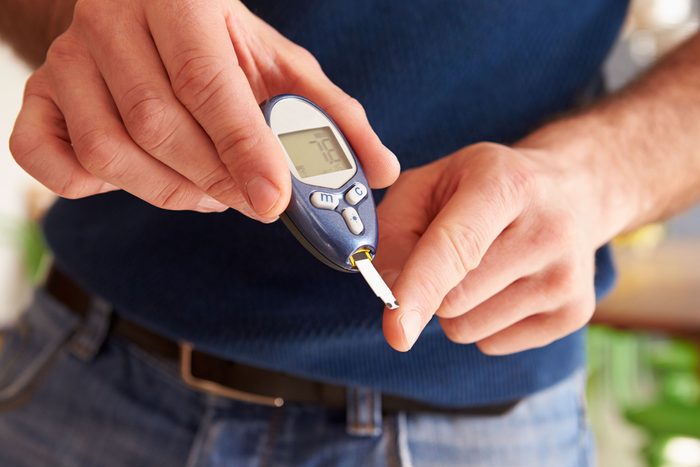
Depression
Are you asking yourself the question, “Why am I always hungry?” One reason could be your mood. Eating can be a coping mechanism for people with depression or anxiety. Part of this might be because they don’t have enough of the feel-good hormone serotonin, and eating comfort foods like pasta and bread can bring those levels up, says Holly Lofton, MD, weight management specialist and director of the medical weight management program at NYU Langone Medical Center. “You’re not treating depression with celery,” she says. “It’s whatever your mom gave you to feel good.”
But this coping mechanism might backfire and make your mood worse: People who don’t have a healthy diet are more likely to have symptoms of depression, according to the American Academy of Family Physicians.

Stress
During fight or flight mode, the stress hormone cortisol floods your body, which convinces your body to eat, even if you don’t physically need the calories, says Shanna Levine, MD, an internist in New York. “It’s not out of necessity, but cortisol tells your brain that you’re not full,” she says. “That’s why stress causes people to overeat.” But there are healthier ways to cope with stress.

Hyperthyroidism
If you’re hungry all the time and eating more than usual but are somehow still dropping pounds, your thyroid could be overproducing hormones, triggering your body to kick things up. “Think of the thyroid as an endocrine hormonal organ that speeds everything in the body up,” says Dr. Lofton. “So you would also speed up metabolically, and increase their hunger as a result.” The thyroid is also involved in satiety, so you might find your cravings harder to satisfy if it’s overactive, says Dr. Levine. See if your hunger is paired with fatigue, moodiness, brittle nails, or hair loss—they’re all signs of hyperthyroidism.

Obesity
Overeating can lead to weight gain, but in a vicious cycle, obesity itself can also make you hungry all the time. Excess fat could cause your insulin levels to skyrocket, making your appetite go up in response, says Dr. Lofton. Plus, fat cells make your body less sensitive to the satiety hormone, leptin, says Dr. Levine. “Because fat produces its own hormones, part of obesity is that people tend to feel more hungry than someone with higher metabolism and in better shape,” she says. Look out for these other sneaky things that could affect your weight, regardless of diet and exercise.

Hypoglycemia
Low blood sugar can come from a number of causes, from meal skipping to pancreas problems. But the result is the same: a growly tummy while your body begs for an energy boost. “The body produces hunger as a signal to the brain to tell you to take in more food to have enough blood glucose to enter the cells,” says Dr. Lofton.

Diabetes
Type 1 and type 2 diabetes both mess with sugar levels, which can create a cycle of hunger when people try to get their blood sugar back on track. Low blood sugar triggers appetite, but going overboard can make those cravings worse. “What happens is people overeat and get too high of sugar levels, which also cannot be satiating,” says Dr. Levine. “It’s a cause and effect that goes back and forth.” Even if you’re hungry all the time, try keeping your blood sugar steady by staying away from carb-heavy or refined, processed foods, she says. Instead, read for these diabetes-friendly foods.

Your period
Hormonal changes during your period could lead you to polish off a dozen cupcakes. But you also need more calories to keep up with your body’s extra demands during that time of the month. “It’s a high-energy state for your body, which is why women tend to feel tired and dehydrated,” says Dr. Levine. “In any type of high-energy state, the body physically requires more calories.” Find out what else your food cravings reveal about your health.

Medications
Increased appetite is a side effect of some medications, including SSRI antidepressants, steroids for conditions like allergies or lupus, and anti-seizure medications. Don’t stop taking your medicine though—ask your physician about switching prescriptions. “Any medication you take is a chemical that you’re putting in your body,” says Dr. Lofton. “Talk to your doctor and see if there are any alternatives less likely to cause side effects.”
Dehydration
Even if you feel hungry, you might just be misinterpreting your body’s plea for water. “When you’re dehydrated—before you become physically thirsty—you will feel hungry, and often people mistake that,” says Dr. Levine. She recommends starting the day with an eight-ounce glass of water, then carrying a water bottle with you so you can get 1.5 to 2.5 liters throughout the day. Try to stick with plain water over sugary drinks, which can trick your brain into thinking you’re always hungry, despite the extra calories you’re sipping. Don’t miss these 8 unexpected reasons you’re always thirsty.

Insomnia
Without your recommended seven to eight hours of sleep every night, your body will find it harder to regulate the hormones that control your hunger levels when you wake up. The hunger hormone ghrelin will spike, making you reach for food, even when your body doesn’t need the calories. “Every day, you’re getting up and have metabolic demands,” says Dr. Levine. “It’s a form of stress when you deprive yourself of sleep and cause hormone dysregulation.” Here’s what else happens to your body when you don’t get enough sleep.
